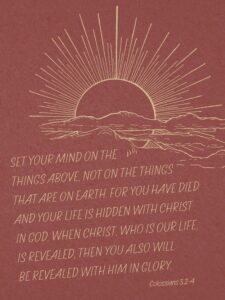
The question may seem to be a simple one. “Who died on Good Friday?” The answer, of course, is that Jesus Christ, the Lamb of God, died on Good Friday. Every year on the Friday before Easter, the church remembers the substitutionary death of the Son of God on the cross. Peter put it this way, “For Christ also died for sins once for all, the just in for the unjust, so that He might bring us to God” (1 Pet 3:18). Jesus is the one who died on Good Friday.
But are there any other ways that Scripture would answer the question? In Colossians 3:2–3, Paul provides us an additional answer:
“Set your mind on the things above, not on the things that are on earth. For you have died and your life is hidden with Christ in God.”
Who died on Good Friday? Christ was not the only one who died that day. According to Paul, you did too.
The Crucifixion of the Old Self
Colossians 3 is not the only place where Paul makes this claim. All throughout Paul’s writings, he makes it clear that one of the essential aspects of the believer’s union with Christ is being united to his death. For example, Paul says in Galatians 2:20, “I have been crucified with Christ.” Again, in Romans 6:3, “Or do you not know that all of us who have been baptized into Christ Jesus have been baptized into His death?” The conclusion is inescapable. If you are a true follower of Christ, you died with Christ on Good Friday.
But what does that mean? Dying with Christ can’t mean just physical death, since people don’t keel over and stop breathing the moment they accept Christ as Savior and Lord. Instead, Paul explains just a few verses later in Romans 6, “knowing this, that our old self was crucified with Him, in order that our body of sin might be done away with, so that we would no longer be slaves to sin” (v. 6). It wasn’t our physical life that died with Christ on Good Friday. Instead, it was our old self, our body of sin. The old self is comprised of every desire, thought, word, action, and habit that opposes God. Instead of giving God the glory, the old self robs glory and arrogantly seeks to exalt itself. Instead of delighting in God alone, the old self delights in the filth of illicit pleasures and sins. Instead of listening to God’s words, the old self spurns God and seeks to do its own will. The old self lives inside each and every one of us, and it controlled us. The old self controlled us up until it died, until God crucified it.
In a different passage Paul also explains how God crucified the old self. In 2 Corinthians 5:21, Paul writes, “He [God] made Him [Jesus] who knew no sin to be sin on our behalf, so that we might become the righteousness of God in Him.” Where was our old self on Good Friday? It was on Jesus. It was Jesus. God made Jesus, the blameless Son of God, become our sin on the cross. Jesus is the only human who never sinned, and yet Jesus became the embodiment of the old self, bearing the wrath of God that we deserve, so that we might be free of the old self’s grip.
Implications
How should the fact that your old self died on Good Friday impact you this week? Hopefully in a couple of ways.
First, when you cast your mind’s eye to Calvary this week, see more than just a man on a cross. See the true horror of the old self’s wickedness exposed. Our hearts are so often calloused to the depth of sin that they are capable of and the disastrous results. The crucifixion of the old self cuts right through that callousness. When you consider the bleeding hands of the old self, nailed to the cross, connect that to your hands whenever they build up your own kingdom rather than God’s. Gaze upon the crown of thorns piercing the head of the old self, and recognize the hateful, bitter thought you just had towards your spouse. Force yourself to look at the tortured, unrecognizable face of the old self, and then evaluate every lustful glance you’ve taken towards something that doesn’t belong to you. The crucifixion of the old self compels us to recognize the deadly consequences of living for ourselves.
Second, meditate on the beautiful truth that if you are in Christ, you no longer are enslaved to sin. You no longer have to live for yourself and for your sinful desires, and that’s because, praise be to God, that old self died with Christ. Now the task of the believer is to daily choose to live for righteousness rather than sin, because believers are dead to sin and freed from it. There’s a reason why stories about zombies are so grotesque and unnatural: dead things are supposed to stay dead. In the same way, the old self died; don’t let it continue to live and have control in your life.
Third, worship Christ because of the love that motivated him to go to such lengths to rescue our souls. He became our sin on the cross and bore God’s wrath so that our old self might be crucified. “In this is love, not that we loved God, but that He loved us and send His Son to be the propitiation for our sins” (1 John 4:10). That is a love that is worthy of our awe.
One of the songs the choir is going to sing at our Good Friday service is The Power of the Cross by Keith Getty and Stuart Townend. Here is a portion of the lyrics we’ll be singing:
Every bitter thought, every evil deed
Crowning Your bloodstained brow.
This the power of the cross:
Christ became sin for us.
Took the blame, bore the wrath;
We stand forgiven at the cross.
May we ever grow in our love for the Savior who became sin for us that we might become his righteousness.
 Church
Church